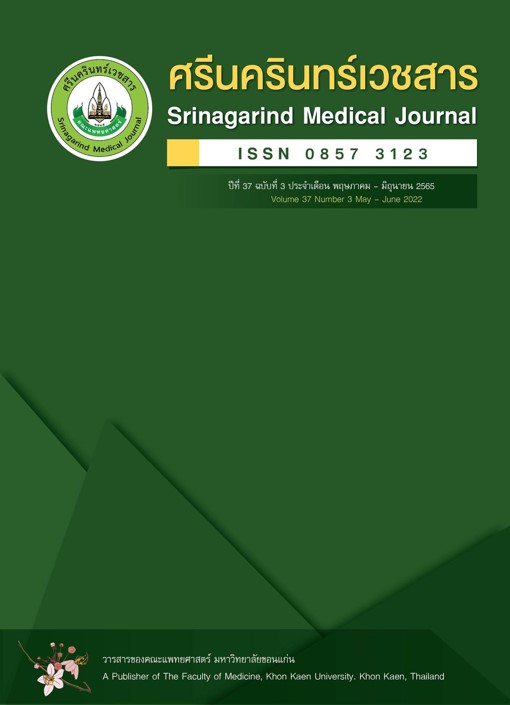Incidence and Quality of Life of Early Childhood with Thyroid stimulating hormone greater than 25 mU/L in Sakon Nakhon Hospital
Abstract
อุบัติการณ์และคุณภาพชีวิตเด็กปฐมวัยที่มีฮอร์โมนกระตุ้นต่อมไทรอยด์มากกว่า 25 mU/L ในโรงพยาบาลสกลนคร
สมนึก อภิวันทนกุล1*, สุดารัตน์ ศิริชัยพรศักดิ์2, นิยะดา บุญอภัย3
1กลุ่มงานสูติ-นรีเวชกรรม โรงพยาบาลศูนย์สกลนคร
2กลุ่มงานกุมารเวชกรรม โรงพยาบาลศูนย์สกลนคร
3กลุ่มงานการพยาบาลชุมชน โรงพยาบาลศูนย์สกลนคร, จังหวัดสกลนคร, 47000
หลักการและวัตถุประสงค์: ทารกที่มีฮอร์โมนกระตุ้นต่อมไทรอยด์ มากกว่า 25 มิลลิยูนิตต่อลิตร (Thyroid stimulating hormones; TSH > 25 mU/L) มีโอกาสเกิดพัฒนาการล่าช้า ภาวะบกพร่องทางสติปัญญา และการเคลื่อนไหว ส่งผลกระทบต่อคุณภาพชีวิตเด็ก ดังนั้นการศึกษานี้จึงมีวัตถุประสงค์เพื่อศึกษาอุบัติการณ์ของทารกแรกเกิดที่มีภาวะพร่องไทรอยด์ฮอร์โมนแต่กำเนิด คุณภาพชีวิตของเด็กปฐมวัยที่มี TSH > 25 mU/L
วิธีการศึกษา: เป็นการศึกษาเชิงพรรณนา (Descriptive study) ในเด็กปฐมวัยที่มี TSH > 25 mU/L เมื่อแรกเกิดทุกรายและผู้ดูแลเด็ก ในปี พ.ศ. 2559 - 2563 จำนวน 27 ราย ในเขตอำเภอเมือง จังหวัดสกลนคร ที่มารับบริการในคลินิกสุขภาพเด็กดี เครื่องมือที่ใช้รวบรวมข้อมูลคือแบบสอบถาม ที่มีค่าความตรง เท่ากับ .89 และค่าความเชื่อมั่นของสัมประสิทธิ์อัลฟาครอนบาค เท่ากับ .85 วิเคราะห์ข้อมูลโดยใช้สถิติเชิงพรรณนา
ผลการศึกษา: อุบัติการณ์ของทารกแรกเกิดที่มีภาวะพร่องไทรอยด์ฮอร์โมนแต่กำเนิด คิดเป็น 1:1,116 คุณภาพชีวิตเด็กปฐมวัยที่มี TSH > 25 mU/L อยู่ในระดับไม่ดี ร้อยละ 75.7 โดยพบว่าด้านสัมพันธภาพทางสังคมและด้านสุขภาพกาย คิดเป็น ร้อยละ 67.6 และ 72.7 ตามลำดับ ความสมบูรณ์แข็งแรงของเด็กในปัจจุบันอยู่ในระดับไม่ดี ร้อยละ 79.6
สรุป: อุบัติการณ์ของภาวะพร่องไทรอยด์ฮอร์โมนแต่กำเนิดในโรงพยาบาลสกลนคร ยังคงสูงและเด็กปฐมวัยส่วนใหญ่มีคุณภาพชีวิตไม่ดี ดังนั้นหญิงตั้งครรภ์ทุกคนจำเป็นต้องเสริมไอโอดีนทุกวัน และดูแลการเจริญเติบโต และเพิ่มการกระตุ้นพัฒนาการเด็กปฐมวัย ด้านสังคม ด้านร่างกาย และคุณภาพชีวิต
Background and Objective: Infants with Thyroid-stimulating hormone greater than 25 mU/L (TSH > 25 mU/L) are more likely to have developmentally delayed, cognitive and motor impairment, affecting the quality of life of children. This study aimed to determine the incidence of newborns with congenital hypothyroidism, and quality of life in early childhood with TSH > 25 mU/L.
Methods: This descriptive study was conducted on 27 early childhood who had TSH levels greater than 25 mU/L, and their caregivers from 2016 to 2020 in Mueang district, Sakon Nakhon province. Data was collected at well-baby clinics by questionnaires. The index of item objective congruence was at .89 and Cronbach’s alpha coefficient was 0.85. The data was analyzed using descriptive statistics.
Result: The incidence of newborns with congenital hypothyroidism was 1:1,116. The overall quality of life in early childhood with TSH > 25 mU/L was poor at 75.6%. The lowest score was the social relationship and physical health 67.6%, and 72.7%, respectively. Most of them have a poor level of health and wellness at 79.6%.
Conclusions: Incidence of congenital hypothyroidism in Sakon Nakhon hospital still high, and most early childhood had poor quality of life. There is a need for all pregnant women to take an iodine supplement every day, and take care of the growth, and stimuli of the newborn to improve social, physical, and quality of life.


